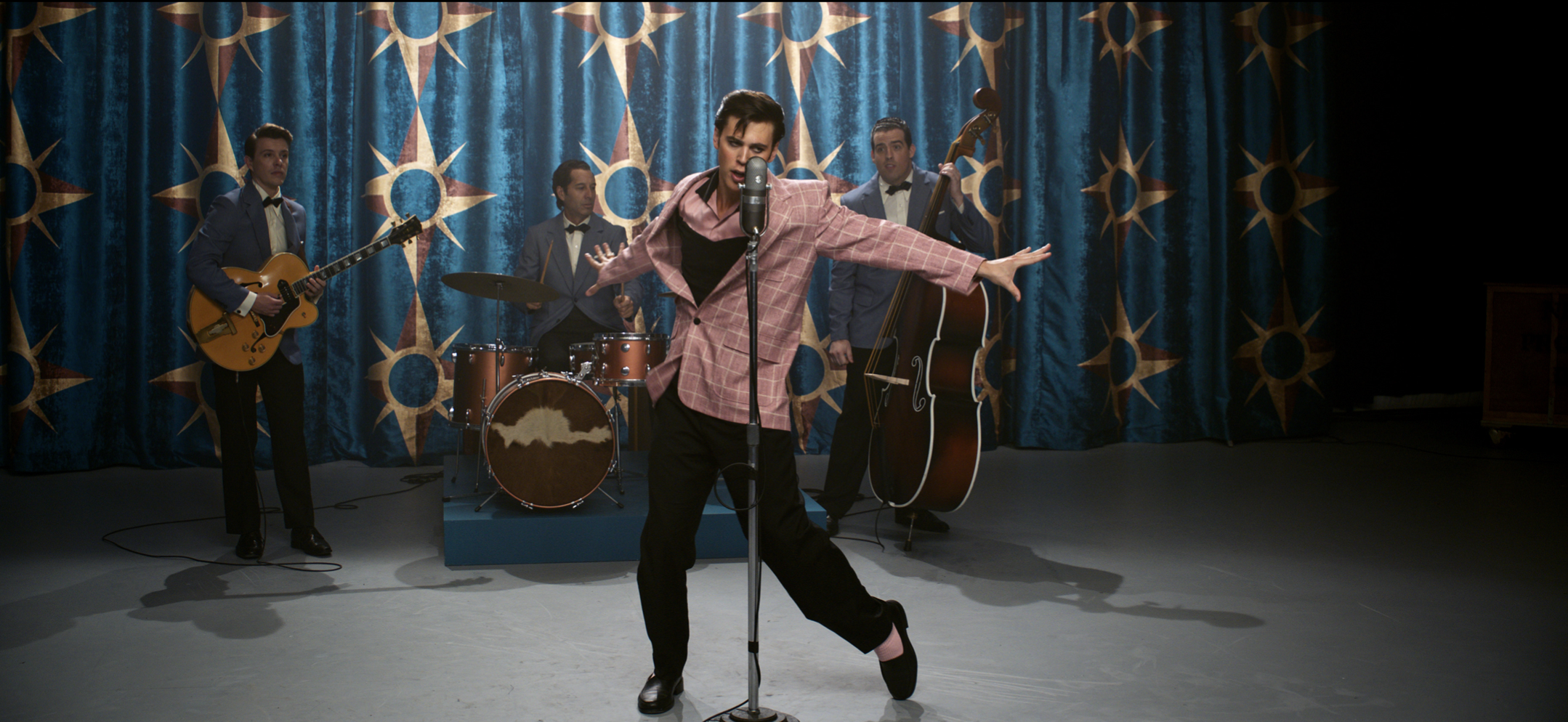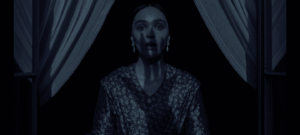The hair, the glitz and glamor, and above all, the pelvis have made Elvis a household name for decades. So what more is there to discover about the music industry star so influential that he was dubbed “The King?” And what business does Austin Butler—who faced much skepticism as the right choice for the role—have playing Elvis himself?
Butler is best known as a teen heartthrob, most notably in his portrayal of Sebastian on The CW’s The Carrie Diaries. He’s also made a litany of guest appearances on Disney and Nickelodeon shows as the object of a character’s affection for an episode or two. Butler may not seem like the obvious casting choice, but it’s precisely his malleability that makes him the perfect fit in Elvis’ blue suede shoes.
In the opening minutes of the film, we barely see Butler’s face: we see his back profile as he leans on a wall and taps his foot; we see his hips shaking and his iconic gelled hair as he prepares for his first performance in the movie; and we see clips of his younger self in Tupelo, Mississippi, immersed in the blues and gospel music that influenced his own body of work. Director Baz Luhrmann cleverly utilizes these early shots to evoke the lore of the King, an artist recognizable from tidbits alone.
Like the up-and-comer in the 1950s, Butler infuses his early performances with more of his own flair. The lead single off the film’s soundtrack, Doja Cat’s “Vegas” which samples Big Mama Thornton’s “Hound Dog,” plays as the budding star strolls Beale Street in Memphis, Tennessee. This area serves as Elvis’ home base in the film, as his family settled there when he was 14. By pairing the 2022 hit with Butler’s modern-day swagger, the film establishes that it’s not just an Elvis biopic, but a story about the music industry, race, and the American South that still rings true today.
Nicknamed “Elvis the Pelvis” early in his career, it’s obvious that his dance moves are inextricable from his singing because of where he gained his love for music. He was heavily influenced by Black genres like gospel, blues, and jazz, and the dancing that goes along with them, and therefore faced criticism for blurring racial boundaries in the Jim Crow-era South, and promoting so-called “animalistic” behavior on stage.
Elvis doesn’t shy away from giving due credit to his influences, and clarifies that he would not have been exalted as the King without his exposure to Black music and culture. The first appearance of the song “That’s All Right Mama,” which Elvis recorded as his debut single in 1954, is when an adolescent Elvis watches a Black artist perform it. Indeed, the song was written and first performed by a Black artist, blues singer Arthur Crudup, eight years prior to Elvis’ recording—a fact that the film doesn’t allow viewers to forget. In a scene much later, when Elvis begins his Las Vegas residency at the International Hotel, he creates a new arrangement of the song with more horns and heavy instrumentation. While he performs, Luhrmann employs a three-way split screen with current Elvis in one panel, a young Elvis in his first recording session in another panel, and the artist who first introduced Elvis to the song in a third.
While Elvis did re-record several songs first performed by Black artists, the film includes a nuanced take on his involvement with the Black community. His attempts to give due credit or show support for the Civil Rights Movement were prohibited by his exploitative and abusive manager, Tom Parker (Tom Hanks), out of concern that it would diminish his financial return. For instance, viewers watch Elvis’ live reaction to learning both Dr. Martin Luther King, Jr. and Senator Robert Kennedy were murdered, and when he later wants to make a statement of support for their political movements, Parker shuts it down. With limited political mobility, Elvis writes and performs a protest song, “If I Can Dream,” at his 1968 comeback special that aired on NBC.
One of the most haunting scenes of the film is near the end, when Elvis learns about gospel singer Mahalia Jackson’s death. Trapped in his gilded cage at the International Hotel, he laments the time he followed Parker’s orders and turned down Jackson’s invitation to perform with her, to which Jackson replied that a real man makes his own decisions. Elvis’ sobs are interspersed with this flashback, and the bright Vegas lights reflect in his humongous black shades, which he now sports even at night. This scene perfectly encapsulates his internal tug-of-war between gaining success and sharing it with those who influenced him, which began with his first performances.
Elvis faces a lot of backlash from segregationists who fear that his dance moves will bring Black influence into the white-dominated music industry. At first, Butler doesn’t seem too comfortable portraying Elvis’ “shaking,” and it’s hard not to cringe. This could be true to character, as it seems that Elvis himself was trying to figure out how to manifest his love for dance into his stage presence.
His first performance in the film—in which he wears a pink satin suit and black eyeshadow—is spliced with preteen Elvis first hears “That’s All Right Mama,” performed by a Black artist as other people dance to the tune. Later, when Elvis’ new manager (and the film’s narrator) Parker lands him a recording gig, the studio heads ask him to stop moving, to which Elvis replies that he can’t sing while standing still.
Luhrmann’s direction often mimics Elvis’ restlessness during his meteoric rise to fame, utilizing fast-paced montages and split screens of different performances. Unfortunately, not all of these cinematographic risks pay off in this film, coming across as cheap gimmicks rather than fully fleshed-out ideas.
The most disappointing editing sequence was during the 1960s, which tracks Elvis’ budding film career after he returns from military service with his bride-to-be Priscilla on his arm. The pair appear superimposed in several cartoonish, animated spaces including a casino wheel and a tour bus. There’s even a montage that mimics the opening credits of a ’60s sitcom, with the names of Elvis’ entourage displayed in a gaudy font as they wave to the camera. Understandably, Luhrmann opted to diversify his storytelling techniques to keep the 160-minute film engaging, but these unconventional editing tactics felt lazy rather than creative.
Luhrmann’s direction shines in the intimate parts of his subject’s life, humanizing him as an artist rather than exalting him as a God. One stand-out moment is a conversation he has with his friend and musical peer, B.B. King (Kelvin Harrison Jr.), at a club on Beale Street in Memphis. Elvis tells King that Parker is trying to get him to stop wiggling on stage, and believes that his manager is protecting him from the threats he’s been receiving of being imprisoned for breaking segregation laws with his dancing. King replies that Elvis is a white man with too many people making money off of him to go to prison, and that there must be another reason (that reason being Parker believes Elvis would bring in more money with “whiter” dance moves). Interspersed with clips of another artist singing in the club and street lights glowing on Elvis’ face, we get a sense of his interiority in this moment—should he record music he loves, and risk backlash from the conservative politicians trying to censor him, or record music to appease “mainstream” white audiences and industry tycoons?
Tensions boil over at Elvis’ next live show, where he performs his song “Trouble” at a benefit concert in Memphis. When he arrives at the venue, his security instructs him to “not so much as wiggle a finger.” Elvis takes his place at the microphone, and tells the audience that although there’s a lot of pressure on him to behave a certain way, “in the end, you’ve gotta listen to yourself,” and that he’s going to show the audience “what the real Elvis is like tonight.” In an act of rebellion, he holds up a pinkie finger and wiggles it around before breaking into song. Parker narrates that in that moment, Elvis ceased to be a man, and “Elvis the God was born.”
This is also the moment that Butler fully embodies the King—confident and smooth, his blue eyes glow against his black suit and dark eye makeup as he glares defiantly at his controlling manager. He begins to sing, “If you’re looking for trouble, you came to the right place,” trading in his dance “shaking” for the pelvic movements he’s known for. At one point, he gets on his knees and leans back, holding the microphone above his head as he croons into it. The camera cuts from close-ups of Elvis (and his hips) to the audience becoming increasingly excited as police struggle to maintain separation between Black and white concertgoers. Viewers also get glimpses of Elvis through black-and-white film cameras, as cinematographer Mandy Walker makes it clear that this performance should be preserved in history and in our minds.
Parker’s narration, though at times amusing, was perhaps the most distracting aspect of the movie. One moment, viewers are immersed in Elvis’ glamorous world, but the next they’re yanked to reality by Hanks’ unconvincing, generically European accent as the manager gives himself credit for Elvis’ fame. The concept of Parker as the unreliable narrator is intriguing, adding a twist to Elvis’ already well-known life story. But perhaps Hanks wasn’t the best choice; he is neither a captivatingly complex villain, nor one that evokes fear. Instead, he seems too busy struggling to maintain an accent to give his dialogue heart.
The most obvious gimmick that Luhrmann employs are the recurring scenes in which an old, decrepit Parker strolls the aisles of an abandoned casino, haunting the place that caused his financial troubles. Parker’s gambling addiction was part of his motivation for exploiting Elvis as his personal cash cow toward the end of his life, forcing him into a years-long Las Vegas residency instead of supporting Elvis’ dream of an international tour. (We also learn that Colonel Tom Parker isn’t his real name, and that he’s an undocumented resident of the U.S., which is why he can’t travel abroad—a fact he neglected to tell any of the Presleys before getting into business with them.) But the poorly-constructed special effects casino and Hanks’ unintelligible dialogue make these scenes more laughable than foreboding.
Next to Butler, the standout star of this film is costuming. Elvis’ early outfits are iconic ’50s, with button-downs undone to the middle and tucked into white trousers, and a pink satin suit reminiscent of Grease’s (1978) Pink Ladies. When the film leaps to the ’60s and his career comeback, Elvis dons flare pants with matching blazers, while his hair maintains its iconic form. But as Elvis begins losing his artistic autonomy, his wardrobe becomes increasingly bedazzled, making him more of a spectacle than a serious musical artist.
Another costuming standout is his wife, Priscilla (Olivia DeJonge). Ten years his junior, the pair got together when she was just 14—a fact which the film breezes over. But in a time jump of over a decade, Priscilla is portrayed as a self-assured wife and supporting partner who makes crucial decisions in Elvis’ career, such as advising him to play the music he loves during his 1968 TV comeback special instead of the Christmas tunes that Parker wants him to perform. With bold, graphic eyeliner, a sky-high bouffant, and vibrant matching sets, Priscilla is anything but a background character.
Though it falls in the biopic genre, Elvis is much more than a mere summary of the King’s life. With Butler’s expert portrayal and the focus on his influences from Black artists, the film balances the star’s talent with giving credit to his music’s originators.





